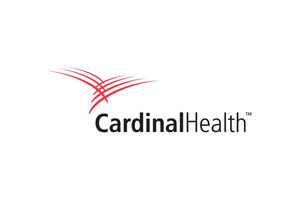Cardinal Health Helps Health Care Providers Prepare for 2010-2011 Flu Season
DUBLIN, Ohio, Sept. 30 /PRNewswire/ -- Although last year's flu season was marked by a particularly aggressive strain of the illness and associated vaccine shortages, pharmacy experts at Cardinal Health expect the vaccine to be in ample supply for the 2010-2011 flu season.
The upcoming 2010-2011 flu season marks the first time that the federal government's Advisory Committee on Immunization Practices (ACIP) has issued a universal vaccination recommendation, encouraging everyone over six months of age to get a flu vaccine unless otherwise instructed by their physician (1).
Kristi Kuper, PharmD, BCPS, clinical director of infectious disease for Cardinal Health, says that while ACIP recommended that high-risk populations, including pregnant women, the elderly and young children, be among the first to receive the vaccine last year; there's no need to prioritize the vaccine this year.
"Our analysis of supply versus anticipated demand indicates that everyone should have timely access to the flu vaccine this year," said Kuper. "We are encouraging hospital and retail pharmacists, physicians, nurses and other health care providers to get vaccinated and to encourage others to get vaccinated, too, especially children."
The 2009-2010 (2) flu season claimed more than 60 million documented cases of influenza, leading to more than 270,000 hospitalizations and 12,000 deaths. While the H1N1 strain will still be circulating during the 2010-2011 flu season, experts predict that three factors will likely lead to lower infection rates this year. First, many will have partial protective immunity from a previous infection. Second, the ample availability of flu vaccines this year should provide everyone the opportunity to get vaccinated; and third, unlike last year when two flu shots were required for maximum protection, this year's flu vaccine will contain both the seasonal influenza strains and the 2009 novel H1N1 strain, so adults will only need a single shot.
Kuper says that because pharmacists can now be licensed in all 50 states, the District of Columbia and Puerto Rico to administer vaccinations to adults over the age of 18, retail pharmacists can play an important role in ensuring all patients have local, convenient access to flu vaccines.
Last year, retail pharmacists were particularly influential in driving vaccinations, administering more than 16 million vaccines (3) and acting as a source of information for concerned citizens. Cardinal Health offers an array of support services to help retail pharmacy customers earn certification to offer vaccinations and promote vaccination services to their local community.
Likewise, Kuper says that hospital pharmacists and other healthcare professionals play a critical role in ensuring that hospital employees – who can be frequently exposed to the flu virus – get vaccinated as early as possible. This step is particularly helpful in limiting flu exposure to more vulnerable patients who are already hospitalized for other illnesses.
Kuper also noted that many health care professionals leverage their role as trusted health care advisers to promote awareness of the importance of being vaccinated by:
- Assessing all patients' flu vaccination statuses and recommending vaccination to those who have not yet received it;
- Encouraging patients to get vaccinated as soon as possible, because flu season peaks in February and March. Influenza vaccines can be administered as late as March or April, although earlier vaccination provides maximum protection.
- Educating parents about the importance of early flu vaccinations for children, especially because some children need to receive two flu shot doses to benefit from full vaccine protection (4)
Cardinal Health distributes pharmaceuticals to more than 40,000 sites every day – including hospitals, retail pharmacies and physician offices. To ensure adequate supply, health care providers place vaccine orders with Cardinal Health by June each year, so vaccine manufacturers know how much to produce. Early shipments of the vaccine for the 2010-2011 flu season began in August of this year.
Retail pharmacists interested in learning about how they can start offering immunizations in their local communities can contact Cardinal Health at 614-553-3950. Hospital pharmacies interested in learning more can contact 1-877-300-9180 or visit cardinalhealth.com/pharmacymanagement.
About Cardinal Health
Headquartered in Dublin, Ohio, Cardinal Health, Inc. (NYSE: CAH) is a $99 billion health care services company that improves the cost-effectiveness of health care. As the business behind health care, Cardinal Health helps pharmacies, hospitals, ambulatory surgery centers and physician offices focus on patient care while reducing costs, improving efficiency and quality, and increasing profitability. Cardinal Health is an essential link in the health care supply chain, providing pharmaceuticals and medical products to more than 60,000 locations each day. The company is also a leading manufacturer of medical and surgical products, including gloves, surgical apparel and fluid management products. In addition, the company supports the growing diagnostic industry by supplying medical products to clinical laboratories and operating the nation's largest network of radiopharmacies that dispense products to aid in the early diagnosis and treatment of disease. Ranked #17 on the Fortune 500, Cardinal Health employs more than 30,000 people worldwide. More information about the company may be found at cardinalhealth.com.
(1) Centers for Disease Control and Prevention; Recommendations of the Advisory Committee on Immunizations (ACIP), 2010
(2) Centers for Disease Control and Prevention, Emerging Infections Program (EIP) Data; April 2010
(3) Pharmacists and Pharmacies: Complementary Vaccination Sites; American Pharmacists Association; 2010
(4) Centers for Disease Control and Prevention; Recommendations of the Advisory Committee on Immunizations (ACIP), 2010
SOURCE Cardinal Health
WANT YOUR COMPANY'S NEWS FEATURED ON PRNEWSWIRE.COM?
Newsrooms &
Influencers
Digital Media
Outlets
Journalists
Opted In





Share this article